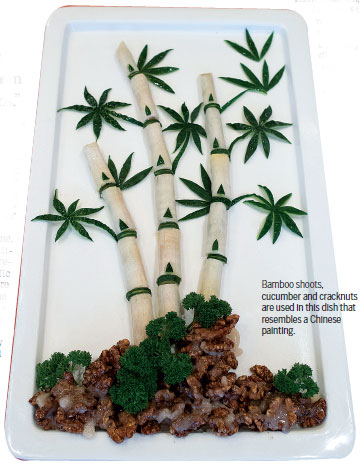Culinary replication at its finest

Founded in 1922 by the Xiao brothers who came from a Buddhist family, Godly is considered one of the first non-religious vegetarian restaurants in Shanghai. Godly is today owned by Shanghai's dining conglomerate Xing Hua Lou Group. In 2016, it posted a revenue of 150 million yuan ($22 million), with up to 80 percent of it coming from mooncake sales.
The restaurant is also considered the birthplace of folk vegetarian cuisine, a subcategory of vegetarian cuisine. The other two subcategories are imperial and temple vegetarian.
In 2008, the cooking technique used by Godly to create vegetarian cuisine was listed as a national intangible culture heritage by the Ministry of Culture. Zhao, who hails from Taizhou, Zhejiang province, was named as the third generation craftsman of the technique.
Folk vegetarian cuisine is a combination of imperial and temple vegetarian cuisines. It has a much shorter history than the other two types of cuisine, which were believed to have peaked during the Qing Dynasty (1644-1911).
This younger cuisine has a more relaxed set of rules than temple cuisine, which refers to food prepared for monks and nuns, and is considered less refined than its imperial counterpart, which was created more as a tribute to ancestors and gods than for consumption.
In folk vegetarian cuisine, eggs and milk are permitted. Other common ingredients include ginger, garlic and spring onions which are rarely used in temple cuisine because monks and nuns believe their strong odors unsettle the peace of mind.
Signature dishes at Godly are similar to those found at the most traditional Chinese vegetarian restaurants. They include "fried crab meat and roes", a dish made from smashed potatoes and carrots, as well as "sweet and sour squirrel-shaped mandarin fish", which features sliced mushrooms that look like the quills of a squirrel.
"These two dishes represent the key challenges of Chinese folk vegetarian cuisine - to look and taste like its non-vegetarian versions," said Zhou Tong, a food critic and consultant in Shanghai who has been studying Chinese cuisine for decades.
Zhou said that the vegetarian crab dish is all about creating a similar, if not identical, flavor as the seasonal river delicacy that is well-loved in eastern China. Its primary ingredients are vinegar, sugar and oil. The key focus of the vegetarian fish dish, on the other hand, is on replicating the texture of carp's flesh.
"Delicacies essentially can be broken down into two elements: flavors and textures. And the magic of Chinese folk vegetarian cuisine is that it manages to create a striking resemblance to meat dishes in either of the two, or sometimes both aspects," said Zhou.
The restaurant's ability to excel on these two fronts stemmed from the ambitions of its first general manager Zhao Yunshao, who was determined to turn Godly into a major culinary player in 1920s Shanghai.
Because he knew little about cooking, Zhao Yunshao hired two chefs who specialized in Huaiyang cuisine - it is famous for its fist-sized pork meatballs as well as sliced chicken and ham - and pushed them to create vegetarian food that tasted the same as the meat dishes. He also enlisted cooks from monasteries to help curate Godly's menu.
Till today, the employee meals for both staff and management teams at the restaurant's two locations in the city only contain vegetables and food made from bean curd and taro.
"Less than 30 percent of our regulars today are vegetarian for religious reasons. But it's important that we preserve the tradition and be respectful to the minority by not killing animals, at least within the places they dine," chef Zhao said.
xujunqian@chinadaily.com.cn
















